
The Smothers Brothers were a duo of American folk singers, musicians, and comedians consisting of siblings Tom and Dick Smothers. The brothers' trademark double act was performing folk songs, which usually led to arguments between them. Tommy's signature line was "Mom always liked you best!" Tommy acted "slow" and Dick, the straight man, acted "superior".

Rocks is the fourth studio album by American rock band Aerosmith, released on 3 May 1976. AllMusic described Rocks as having "captured Aerosmith at their most raw and rocking." Rocks was ranked number 366 on the updated Rolling Stone's list of the 500 Greatest Albums of All Time in 2020. It has influenced many hard rock and heavy metal artists, including Guns N' Roses, Metallica, and Nirvana. The album was a commercial success, charting three singles on the Billboard Hot 100, two of which reached the Top 40. The album was one of the first to ship platinum when it was released, and has since gone quadruple platinum.
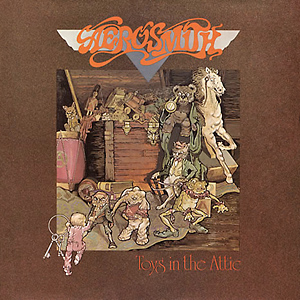
Toys in the Attic is the third studio album by American rock band Aerosmith, released on April 8, 1975, by Columbia Records. Its first single, "Sweet Emotion", was released on May 19 and the original version of "Walk This Way" followed on August 28 in the same year. The album is the band's most commercially successful studio LP in the United States, with nine million copies sold, according to the RIAA. In 2003, the album was ranked No. 228 on Rolling Stone's list of The 500 Greatest Albums of All Time. The album's title track and their collaboration with Run-DMC on a cover version of "Walk This Way" are included on the Rock and Roll Hall of Fame list of the "500 Songs that Shaped Rock and Roll".

Aesop's Fables, or the Aesopica, is a collection of fables credited to Aesop, a slave and storyteller who lived in ancient Greece between 620 and 564 BCE. Of varied and unclear origins, the stories associated with his name have descended to modern times through a number of sources and continue to be reinterpreted in different verbal registers and in popular as well as artistic media.
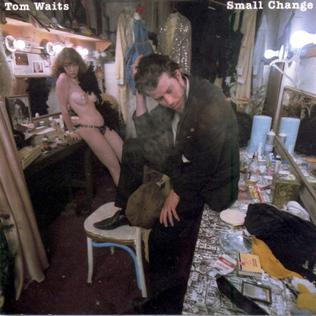
Small Change is the fourth studio album by singer and songwriter Tom Waits, released on September 21, 1976 on Asylum Records. It was recorded in July at Wally Heider's Studio 3 in Hollywood. It was successful commercially and outsold his previous albums. This resulted in Waits putting together a touring band - The Nocturnal Emissions, which consisted of Frank Vicari on tenor saxophone, FitzGerald Jenkins on bass guitar and Chip White on drums and vibraphone. The Nocturnal Emissions toured Europe and the United States extensively from October 1976 till May 1977.

Coast to Coast: Overture and Beginners is a 1974 live album credited to Rod Stewart/Faces. Stewart's practice was not giving concerts as a solo act at the time, but rather appearing jointly with the Faces, thus the dual crediting.

The Fox and the Grapes is one of Aesop's Fables, numbered 15 in the Perry Index. The narration is concise and subsequent retellings have often been equally so. The story concerns a fox that tries to eat grapes from a vine but cannot reach them. Rather than admit defeat, he states they are undesirable. The expression "sour grapes" originated from this fable.

The Smothers Brothers Play It Straight is the ninth album by the Smothers Brothers. As the title indicates, the folk comedy duo were singing the songs "straight". Like the B-side of their second album, Two Sides of the Smothers Brothers, the recording was done in a studio instead of on stage. The album cover shows Tom standing with his guitar and Dick sitting on a stool with his bass lying behind him. There is also a chicken eating chicken-feed, which could be a representation of Frank, Tom's wagon pulling chicken who is discussed on Mom Always Liked You Best!.

"Curb Your Tongue, Knave!" is the fourth comedy album recorded by the Smothers Brothers, released November 1, 1963 on Mercury Records. The album was recorded live at Mister Kelly's in Chicago, Illinois. It reached number 13 on the Billboard Pop Albums chart. Curb Your Tongue, Knave! was the first of their original albums to be reissued on CD.

"Mom Always Liked You Best!" is the eighth comedy album by the Smothers Brothers. It reached number 39 on the Billboard Pop Albums chart. The album was recorded at The Troubadour, Los Angeles, California, The Golden Bear, Huntington Beach, California, and the Flamingo Hotel, Las Vegas, Nevada.

Too Good To Be True is an album by The Everly Brothers, released in 2005.
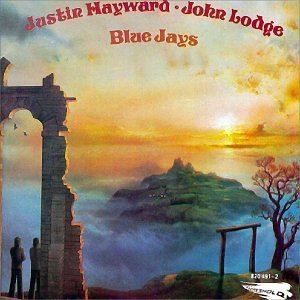
Blue Jays is a 1975 album by Justin Hayward and John Lodge. It was recorded and released during the Moody Blues' five-year hiatus.
The lion's share is an idiomatic expression which now refers to the major share of something. The phrase derives from the plot of a number of fables ascribed to Aesop and is used here as their generic title. There are two main types of story, which exist in several different versions. Other fables exist in the East that feature division of prey in such a way that the divider gains the greater part - or even the whole. In English the phrase used in the sense of nearly all only appeared at the end of the 18th century; the French equivalent, le partage du lion, is recorded from the start of that century, following La Fontaine's version of the fable.

A bedtime story is a traditional form of storytelling, where a story is told to a child at bedtime to prepare the child for sleep. The bedtime story has long been considered "a definite institution in many families".
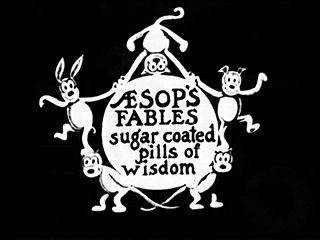
Aesop's Fables is a series of animated short subjects, created by American cartoonist Paul Terry. Produced from 1921 to 1934, the series includes The Window Washers (1925), Scrambled Eggs (1926), Small Town Sheriff (1927), Dinner Time (1928), and Gypped in Egypt (1930). Dinner Time is the first cartoon with a synchronized soundtrack ever released to the public.

The Dog and Its Reflection is one of Aesop's Fables and is numbered 133 in the Perry Index. The Greek language original was retold in Latin and in this way was spread across Europe, teaching the lesson to be contented with what one has and not to relinquish substance for shadow. There also exist Indian variants of the story. The morals at the end of the fable have provided both English and French with proverbs and the story has been applied to a variety of social situations.
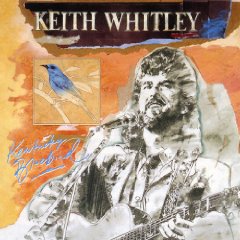
Kentucky Bluebird is the second compilation album by American country music singer Keith Whitley. His first posthumous album, it was released by RCA Records in September 1991. The album consists of four previously released songs, re-orchestrated demos, and other previously unreleased songs, as well as snippets from live performances that predate his professional music career.

The Fox and the Sick Lion is one of Aesop's Fables, well known from Classical times and numbered 142 in the Perry Index. There is also an Indian analogue. Interpretations of the story's meaning have differed widely in the course of two and a half millennia.

The Fox and the Cat is an ancient fable, with both Eastern and Western analogues involving different animals, that addresses the difference between resourceful expediency and a master stratagem. Included in collections of Aesop's fables since the start of printing in Europe, it is number 605 in the Perry Index. In the basic story a cat and a fox discuss how many tricks and dodges they have. The fox boasts that he has many; the cat confesses to having only one. When hunters arrive with their dogs, the cat climbs a tree, but the fox thinks of many ways without acting and is caught by the hounds. Many morals have been drawn from the fable's presentations through history and, as Isaiah Berlin's use of it in his essay "The Hedgehog and the Fox" shows, it continues to be interpreted anew.

Mary Jean & 9 Others is the fourth album by singer-songwriter Marshall Crenshaw. The album was produced by Don Dixon and features a return to the sounds of Crenshaw's earlier work after the country rock excursion of his previous album, Downtown.


















